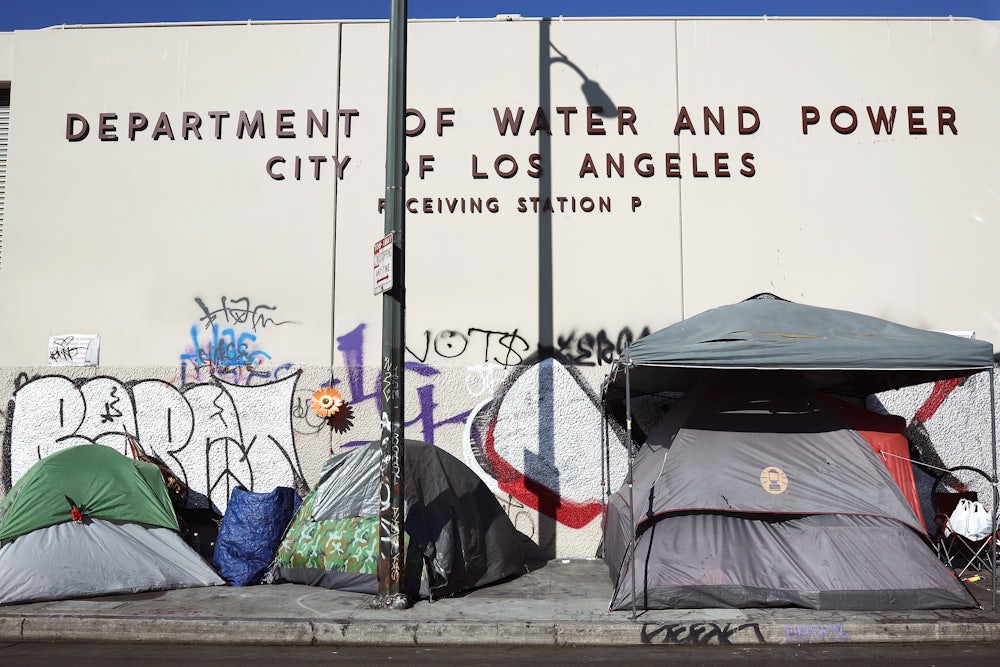While the chaos in our federal government has rightly absorbed the lion’s share of the media’s attention over the past month, life—and worries about where most of us will do our living—isn’t getting any easier further afield. At the moment, more people are facing displacement from climate disasters as they also contend with a housing affordability crisis that forces people onto the street. If Democrats truly want to lay claim as the only responsible political movement in town, they will need to come to some quick decisions, even while locked out of power on Capitol Hill: Will they continue to embrace many of the same out-of-sight, out-of-mind policies that have fallen so hard on the homeless of late, and which have earned the endorsement of conservatives in the Supreme Court and the wider right wing? Or will they choose to see unhoused people as part of the working class they often claim to represent?
Many Democrats serve as mayors in cities that have chosen some of the most punitive policies against the homeless—cities such as Washington, D.C., where unhoused people routinely have their encampments cleared but the organizations that serve them have little support; Los Angeles, where 38 percent of LAPD arrest warrants and citations between 2016 and 2022 were for unhoused people; and New York, where homeless New Yorkers filed a lawsuit calling Eric Adams’s sweeps inhumane and unconstitutional. Although L.A. Mayor Karen Bass has publicly stood against the criminalization of homeless people, the sweeps of encampments continue on her watch.
Meanwhile, the United States saw an 18 percent increase in homelessness from 2023 to 2024. Thirty-nine percent more families with children experienced homelessness in that time frame, according to U.S. Housing and Urban Development data. This is a policy crisis in itself: With nothing but bad ideas being deployed to solve this crisis, the crisis is only deepening.
But lawmakers are seemingly content to double down on the bad wagers they’ve already lost. In Los Angeles, Democratic council members rejected eviction protections for tenants who were financially affected by the Los Angeles wildfires and thus unable to pay rent on time. Despite providing a cap on the number of months they would have these protections and requiring documentation to access the protections, council members still voted “no,” with some claiming there was not enough data to support the proposal or that it would not solve structural housing issues, the LAist reported. But there’s no getting around necessities: Tenants need support now as they face rent spikes of more than 10 percent on what they’re already paying in pricey markets, lest they also find themselves on the street and subject to punitive restrictions.
Moreover, along with the failed attempt to criminalize homelessness into extinction, there have been equally myopic efforts to criminalize the provision of support to unhoused people. In one example of this disturbing trend, the Fremont, California, City Council voted in favor of a ban on encampments, and on “aiding and abetting” those residing in those encampments, last month.
With Republican antipathy toward this vulnerable populace an immutable fact of life, Democrats find themselves at a crossroads. They need a real message on homelessness in America because the one they have now is, at best, muddled and at worst a mirror of the right’s demonization. As homelessness increases, experts on public opinion say that more Americans are beginning to understand the root cause of homelessness as connected to issues of affordability and housing supply, even as political leaders try to send a different message, blaming the victims. Where Democrats fail to connect the dots of homelessness and rising inequality, Republicans have a freer hand to bring increasingly cruel and punitive policies to market, which end up being burnished with a bipartisan gloss.
“Housing first” policies, which give priority to providing permanent housing along with supportive services to provide stability to those in crisis (as opposed to withholding such benefits until certain criteria, such as employment or substance use treatment, are met), have taken a hit. Often, conservatives have vilified unhoused people by linking them with civic disorder and the spread of disease. They have also connected unhoused people with their dehumanizing messages on immigration. President Donald Trump has said he will essentially back further sweeps of homeless encampments, commenting that “the homeless have no right to turn every park and sidewalk into a place for them to squat and do drugs.”
Elon Musk, the billionaire head of the Department of Government Efficiency, a temporary government organization created by President Trump’s executive order that is sowing chaos through gutting federal agencies, has made numerous inflammatory remarks about unhoused people. He has said that the word homeless is a “propaganda word for violent drug addicts with severe mental illness” and referred to San Francisco’s homeless population as “violent, drug zombies.” As many housing advocates have told The New Republic, housing cost and supply issues are the main drivers of homelessness. Regardless of the reasons people find themselves without a stable place to live, no one deserves to live like that, without privacy and basic amenities, and often with a greater threat of violence.
“During and since his presidency, Donald Trump repeatedly made statements that equivocated homelessness with crime, drugs, and mental illness,” Ann Oliva, CEO at the National Alliance to End Homelessness, or NAEH, said, during the election. “His current campaign platform advocates for the forced treatment and involuntary commitment or arrest of unsheltered people.”
Oliva told The New Republic in February that even though she hasn’t seen specific policies targeting “housing first” yet, Project 2025 and the Trump campaign have been clear about their rejection of these policies, and that she has noticed “that key resources related to housing first have been removed from HUD’s website at HUD.gov.”
The Trump administration is set to continue its attacks on unhoused people. It has already halted a HUD equal access rule for housing programs that encouraged trans-inclusive homeless shelters by requiring equal access by gender identity when shelters receive federal funds. The White House is also working on an executive order that would impose draconian policies penalizing unhoused people in D.C. for essentially existing outside, according to The Washington Post’s reporting.
But in this latter example, at least, it can’t be said that the administration’s goals clash with those of the District of Columbia’s Democratic Mayor Muriel Bowser. The Post’s sources said that she sees “shared interests” on this matter with Trump, in stark contrast to her public tone in 2020, when she embraced the public image of herself as a representation of resistance to the president at the height of George Floyd protests, despite her own carceral policies.
Larry, an unhoused person living in a homeless shelter in Silver Spring, Maryland, said he has been without housing since May 2024, having lost a stable domicile after a chronic illness forced him to miss work for an extended period of time. It’s his first experience with being unhoused, he said. He’s just one among a rising population of first-time homeless individuals.
“As far as politics go, these days I don’t see much difference in terms of results between Democrats or Republicans,” he told The New Republic. “In terms of rhetoric, I think Republicans, especially in this age, are more upfront about their methods, whereas Democrats offer a lot of lofty idealism that ultimately falls short when it really counts.”
Democrats, along with the Biden administration, did belatedly appear to recognize that they made a mistake; to more rigorously pursue more robust and sensible responses to the country’s affordable housing crisis. Data continued to show that housing costs were the primary culprit in dragging down the financial well-being of an untold number of Americans. Even here, however, they fell short on addressing the burgeoning homelessness crisis, despite it being the logical end point of so many people caught up in the teeth of this crisis. The NAEH’s Oliva said it was “disappointing” to not hear as much from the Harris and Trump campaigns on addressing homelessness, even as they commented on housing.
Housing advocates nevertheless offer Democrats some praise for the progress they made on the housing affordability front while on the campaign trail. Kamala Harris vowed to increase housing by three million new homes by the end of her first term in office; the topic of housing affordability was a mainstay during her campaign, and she released a bevy of policy ideas to address the huge cost burden weighing down many Americans’ finances.
But the approach from Harris and other political leaders this year did not really acknowledge that the affordability crisis pushed many people from stability to shelters—or into a position where they faced encounters with the criminal justice system for ending up on the street. The Biden administration did, at times, demonstrate how targeted attention could move the needle: Under its watch, the Biden White House’s policies made substantial inroads against homelessness among veterans and rural residents—the homelessness rate among veterans, in fact, fell by 8 percent. Advocates nevertheless say that a much broader approach is necessary to maximize these small but significant gains.
Donald Whitehead, executive director of the National Coalition for the Homeless, said while he applauded some of the efforts from the Biden administration to address homelessness, such as providing more money for programs for rural people in need of stable shelter, these efforts fell well short of the mark.
“I do think those measures are incomplete and inadequate. Because in order to stop the inflow of homelessness, the issue has to be addressed in a comprehensive way.… I think these targeted approaches may help in the short term for that population, but they really do nothing to address the overall issue,” he said.
Warner Johnson, a formerly unhoused person who now lives in Takoma Park, had been homeless for about three years until September 2024.
“I’m one step away still from being homeless again. Everybody really is these days because we don’t know what’s going to happen,” Johnson said of the economic and political uncertainty of our times, compounded by a range of looming crises, such as the president’s deportation scheme and the burgeoning prospect of a bird flu pandemic.
That we’re in the grips of a systemic affordability crisis is not lost on him. “We’ve seen in these past 20 years that the rent, regardless of who’s been in office, has been steadily going up,” he said. “At one time it was a good mortgage rate, but slowly all of that went out the window—where do they come with the extra money to send for wars? I never understood that.”
Johnson believes that the government should devote more resources to housing solutions. In this, he is not alone: Polling has shown that housing affordability and homelessness are priorities for a majority of voters and that more than 70 percent of voters would support candidates who support housing first policies rather than punitive approaches. According to a 2024 Morning Consult poll, a majority of Democrats and Republicans have said it should be a priority for the federal government to make sure people have safe and affordable places to live and 53 percent said it should be a top priority.
“As more and more Americans feel insecure about their own housing situation and feel that housing costs are rising at a rate that they’re worried about whether they’re able to keep up with them, I think that that has impacted the lens through which they view homelessness,” said Rebecca Naser, partner with Hart Research.
An August and September 2024 Hart Research Associates poll on housing policy in South Carolina found 90 percent of voters—and even 87 percent of Republicans—supported policies that protect renters from excessive rent increases, harassment, and discrimination from landlords and unfair evictions. In Ohio, the numbers were similar, with 92 percent of voters and 87 percent of Republicans supporting these policies.
Democrats frequently treat homelessness as a social issue instead of an economic one. Advocates say that this approach falls short in one important regard: It prevents those who aren’t facing these crises from understanding their connection to the experiences of the unhoused and how bad policy decisions contribute to people being plucked from the ranks of the haves into the mass of have-nots. Forging these connections is more than possible: As more people become homeless, more voters know people who have lost their homes, giving rise to avenues for unity and solidarity. Democrats can make the most of this by elucidating plans to help reverse this process, bringing the homeless back into the ranks of the housed, and shoring up stability for all.
“During the campaigns, we heard a lot of conversation about the unaffordability of housing and the cost of rent going up,” said Kim Johnson, manager of public policy at the National Low Income Housing Coalition. “But rarely was that really connected to ‘Hey, housing is unaffordable, people are not being paid enough to live, and that is the root cause of why people are experiencing homelessness.’ I think, too often, they are treated as two separate issues when in fact they’re deeply intertwined and can’t be separated.”
As the political pundits keep reminding us, Democrats are on a voyage of “soul-searching”: a vision quest to figure out what it is, exactly, the party should stand for. If surveys of voter sentiment are any guide, homelessness is an issue of ever-ripening importance. The data beyond the polling also suggests that this is a foundational concern: Even as more Americans lose their grip on housing, those who have maintained stable accommodations are finding themselves drawn into this vortex; growing numbers of Americans say they have had a homeless friend, and many others say they have had a homeless family member. With so many Americans coming to understand that they have a stake in standing up for homeless people, it would be political malpractice for Democrats to fail to rise to this occasion.










